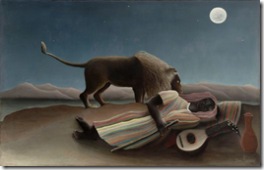Why are gypsies commonly believed to be able to foretell the future?
This is the question that sets Pierce Moffett, the hero of John Crowley’s novel Aegypt, in search of the true origin of the Roma, and with it the true meaning of history. In his novels about Moffett, Crowley unravels a world in which history not only can be broken into different periods (The Dark Ages, The Renaissance, The Enlightenment, et. al.), but in which the rules by which the world works shifts and ruptures between these eras.
And there are in fact people who believe such things. A friend once told me about a history professor of his who lectured on the prevalence of sightings of angels and spirits in Medieval and Renaissance literature, and questioned how so many people could believe such things. His radical conclusion, which he believed irrefutable, was that such things must have once been real.
John Crowley himself is a skeptic on such matters, as people often are who play too much at pretending to believe. At a certain point, one must choose either to cross the line into a possible madness, or draw back into a more definite epoche — a suspension of belief.
We, who have not stepped so deeply into these mysteries, are in a safer position to toy with possibilities, engaging in what Coleridge called the suspension of disbelief. It is what allows us to understand and even share in Don Quixote’s delusions, without thereby succumbing to them ourselves.
When I lived in Prague a few years back, there were stories about a gypsy bar on the edge of the city where one could meet gypsy princes and sip absinthe, a concoction that is illegal in much of the developed world. I never went of course, partly from a lack of courage, and partly out of a fear that confronting the thing itself would dispel for me the image I had already formed in my imagination of that magic place.
Over the years, I’ve privately enjoyed several fantasies about that bar. In some of these, I drink the absinthe and am immediately transformed, through a sudden revelation, into a passionate artist who spends the rest of his life trying to paint something he cannot quite capture. In others, I am accosted by a gypsy prince, and, defeating him in a bloody duel with knives, I leave with his gypsy bride. In most, I simply am kidnapped by the gypsies while in the grips of an absinthe induced haze, and eventually learn their ways and join their tribe, traveling across Europe stealing from the rich and conning the gullible.
Such is my secret life, for what it is worth. Inspired by this secret dream to be a gypsy, I have been listening to an album called Gypsy Groove, groove being the postpositional modifier that does in the 21st century what hooked-on did for us in the 20th. The copywriting claims it is “a collection of Balkan beats, gypsy jams and other treats from the leaders of this vibrant music scene.” I prefer the way my son (a natural poet, I believe) describes it: “it makes my ears sing and my butt dance.” I am especially fond of the song Zsa Manca, by the Czech group !DelaDap.
According to Pierce Moffett, the gypsies are refugees from a time that no longer exists, from a country called, not Egypt, but rather its mythical homophone, Aegypt. In order to explain this strange origin, Crowley builds a fictional story on top of a true story about how scholars in the Renaissance mistakenly projected the origins of certain texts, already ancient in their own time, to a pre-history even more ancient, and a provenance somewhere in the geographical Egypt.
If you don’t already know this story (either the false one or the real one), and you have the patience for it, here is John Crowley’s explanation of both, from Love & Sleep:
It was all true: there really had once been a country of wise priests whose magic worked, encoded in the picture-language of hieroglyphics. That was what Pierce had learned in his recent researches. It did lie far in the past, though not in the past of Egypt. It had been constructed long after the actual Egypt had declined and been buried, its mouth stopped because its language could no longer be read.
And this magic Egypt really had been discovered or invented in Alexandria around the time of the Christianization of the Roman Empire, when a Greek-speaking theosophical cult had attributed some mystical writings of their own to ancient priests of an imaginary Egyptian past of temples and speaking statues, when the gods dwelt with men. And then that imagined country really had disappeared again as those writings were lost in the course of the Christian centuries that followed.
And when they were rediscovered — during the Renaissance in Italy, along with an entire lost past — scholars believed them to be really as ancient as they purported to be. And so a new Egypt, twice different from the original, had appeared: ancient source of knowledge, older than Moses, inspiring a wild syncretism of sun-worship, obelisks, pseudo-hieroglyphs, magic and semi-Christian mysticism, which may have powered that knowledge revolution called science, the same science that would eventually discredit imaginary Egypt and its magic.
And yet even when the real Egypt had come to light again, the tombs broken open and the language read, the other country had persisted, though becoming only a story, a story Pierce had come upon in his boyhood and later forgot, the country he had rediscovered in the City in the days of the great Parade, when he had set out to learn the hidden history of the universe: the story he was still inside of, it seemed, inescapably.
Aegypt.
Just this year, John Crowley finally published the fourth book in his Aegypt Quartet, bringing the series to a close. It is called Endless Sleep.

